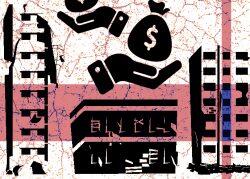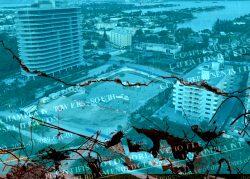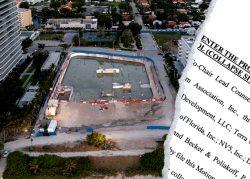Champlain Towers South unit owners will receive an $83 million payout for the loss of their condos, a controversial outcome to the monthslong dispute over how financial disbursements should be divided between those who lost loved ones and those who lost their units.
Miami-Dade Circuit Court Judge Michael Hanzman approved the settlement on Wednesday evening, after an almost four-hour, emotionally charged court hearing. Survivors and families of victims spoke out against the agreement but also recounted the horror of the night the tower collapsed and their struggle in the ensuing months after losing family members, friends and neighbors.
It is the first major settlement to be approved in the case that seeks justice for the 98 people who died in the June 24 collapse of Champlain Towers South.
Hanzman said the settlement is contingent on the sale of the oceanfront property at 8777 Collins Avenue. An auction is expected to occur in May, with the stalking horse bidder, Dubai-based developer Damac Properties, offering the minimum price of $120 million.
“To hear these stories… to hear people talk about their loved ones, it’s just brutal on so many levels. On top of that, we have people who lost their homes,” Hanzman said. “The reality is a court has to adjudicate issues not based on feelings, not based on viewpoints or emotion. I have to decide cases based upon the law.”
The money, which would come from sources including insurance and the future sale of the site, would be divided among owners of the 136 units based on their percentage ownership stake in the building, pursuant to the condo declaration. In exchange, unit owners would be off the hook from potential liability for the collapse. A state law says condo owners could be charged up to the value of their unit in events such as the collapse.
Read more



Still, unit owners have the right to opt out of the settlement in an effort to receive a higher payout, but also would be exposed to liability under the state law.
Hanzman will not deduct any insurance disbursements that unit owners may have received so far from their own private property policies. He said owners should not be penalized for deciding to take out their own policy. In addition, Hanzman won’t be deducting payouts for life insurance policies, once it comes time for disbursements to those who lost loved ones, he said.
Out of the total settlement, Hanzman deducted $750,000 to cover land maintenance expenses accrued so far, as well as for costs for the receivership and legal expenses.
The $83 million agreement was reached following months of negotiations with court-appointed mediator Bruce Greer.
During Wednesday’s hearing, Hanzman heard moving testimony from family members of the victims, as well as unit owners who are dealing with the trauma of having survived the collapse.
Eileen Rosenberg, who lost her 26-year-old daughter in the tragedy, said that she was sympathetic to the unit owners’ economic loss, but argued that it was fair to first compensate the families of the victims who died.
“My pain is unbearable. I am constantly suffering. My heart is shattering into a million pieces and beyond repair. My precious daughter unknowingly walked into a building that was neglected and improperly maintained, which tragically caused her her life,” said Rosenberg, whose daughter was a visitor in the building.
“When you invest and lose money, you move on. When you lose a child, you cannot move on,” she added.
Tali Naibryf, whose brother Ilan died while visiting his girlfriend in the building, urged the judge to cap the allocation to unit owners to $83 million, and to make that contingent on the sale of the land.
“My brother was invited into the building, not warned of any damage, and paid the ultimate price,” she said.
Unit owners who spoke took issue with the court’s classification of them as the “property and economic loss class,” saying they also lost friends and neighbors and have been struggling with the trauma.
“I live with this every night when I go to sleep and when I wake up,” said Raysa Rodriguez, who lived in a ninth-floor unit and was able to exit the building after the collapse.
They also spoke against the state law that exposes them to liability if they opt out of the settlement, saying it feels as if it ascribes to them fault for the alleged lack of building maintenance, and therefore also for the collapse.
Champlain condo owner Deborah Soriano, who escaped from her 11th-floor unit the night of the collapse, said she was served with a notice about the state law at her office.
“Yes, I felt like a real criminal. When did [we], the victims, turn into criminals?” she said in court. “What have we really done wrong? None of us in that building would ever put our lives or their lives in any type of danger.”
Some unit owners also argued that the settlement is not enough for them to buy a new home, similar to the one they had in Champlain, especially in light of high South Florida housing costs. Many have been forced to become renters at a time when the multifamily market has seen rents skyrocket.
Hanzman, who said the state law does not ascribe fault to the unit owners but merely subordinates their equity, pushed back on claims that property owners are being shortchanged.
“The claim that they are being victimized and penalized and need more money, that is falling on deaf ears,” the judge said in court. Unit owners may not be able to buy a home in Miami Beach or Surfside, but the disbursement provides them with a payout, as well as “certainty,” he said.
Hanzman also encouraged those opposing the settlement to consider the alternative of allowing the case to run its course through the court before any disbursements are allocated.
“This allocation issue would take at least four to five years to work its way through the courts,” Hanzman said. “In that time period, the economic people would not receive a dime of compensation and neither would the wrongful death class.”
Hanzman has been overseeing the litigation surrounding the collapse.
Last month, survivors and families of the victims of the Surfside condo collapse sued the condo association of the neighboring property, Eighty Seven Park, and additional companies involved in the construction of that luxury condo tower next door.
The filing, which marks the third amended complaint, alleges that the former president of Eighty Seven Park’s condo association knew or had reason to know about the damage the construction was allegedly causing Champlain, and that the firms involved in construction were negligent in their work. The former condo association president worked for Terra, the lead developer of Eighty Seven Park.
Morabito Consultants, the engineering company that Champlain hired for its 40-year inspection and that was supervising restoration, as well as the Champlain association’s law firm, Becker & Poliakoff, recently settled their share of the litigation through mediation for $16 million and $31 million, respectively.
“I know there are a lot of hard feelings in this case,” Hanzman said. “There’s obviously some discomfort, and that makes it even more evident this is a fair and adequate settlement, because settlement is compromise.”
